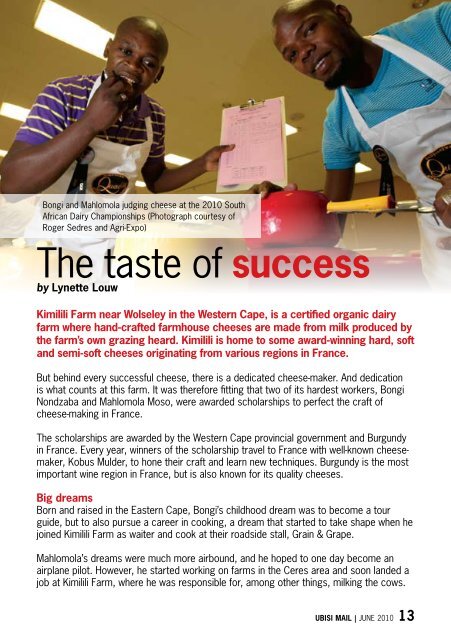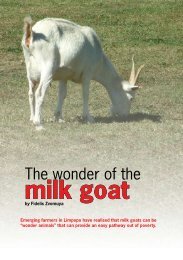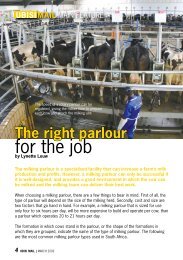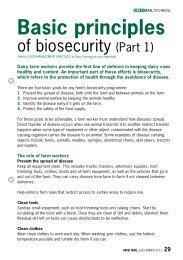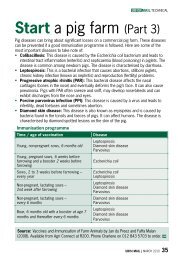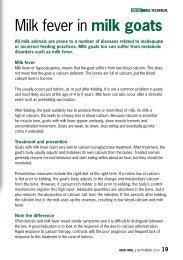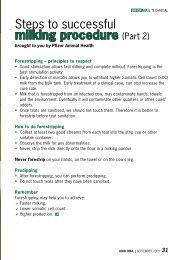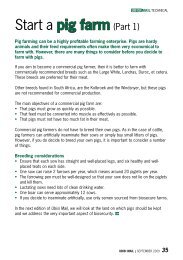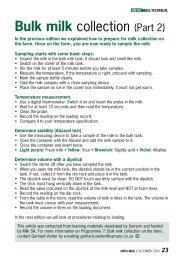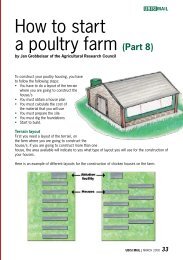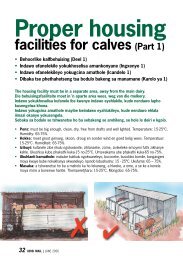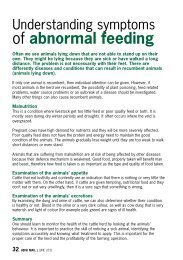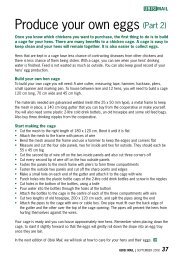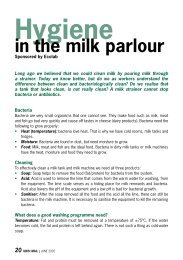T - Ubisi Mail Magazine
T - Ubisi Mail Magazine
T - Ubisi Mail Magazine
- No tags were found...
You also want an ePaper? Increase the reach of your titles
YUMPU automatically turns print PDFs into web optimized ePapers that Google loves.
Bongi and Mahlomola judging cheese at the 2010 SouthAfrican Dairy Championships (Photograph courtesy ofRoger Sedres and Agri-Expo)The taste of successby Lynette LouwKimilili Farm near Wolseley in the Western Cape, is a certified organic dairyfarm where hand-crafted farmhouse cheeses are made from milk produced bythe farm’s own grazing heard. Kimilili is home to some award-winning hard, softand semi-soft cheeses originating from various regions in France.But behind every successful cheese, there is a dedicated cheese-maker. And dedicationis what counts at this farm. It was therefore fitting that two of its hardest workers, BongiNondzaba and Mahlomola Moso, were awarded scholarships to perfect the craft ofcheese-making in France.The scholarships are awarded by the Western Cape provincial government and Burgundyin France. Every year, winners of the scholarship travel to France with well-known cheesemaker,Kobus Mulder, to hone their craft and learn new techniques. Burgundy is the mostimportant wine region in France, but is also known for its quality cheeses.Big dreamsBorn and raised in the Eastern Cape, Bongi’s childhood dream was to become a tourguide, but to also pursue a career in cooking, a dream that started to take shape when hejoined Kimilili Farm as waiter and cook at their roadside stall, Grain & Grape.Mahlomola’s dreams were much more airbound, and he hoped to one day become anairplane pilot. However, he started working on farms in the Ceres area and soon landed ajob at Kimilili Farm, where he was responsible for, among other things, milking the cows.UBISI MAIL | JUNE 2010 13
EMPOWERMENTBoth young men eventually ended up working at the farm’s cheese-making operationand soon both were actively involved in producing the farm’s award-winning cheeses,together with farm owner and manager, Robert von Tobien. Their hard work paid offand it was literally the cherry on the cake when they were awarded the bursaries.In Burgundy“Besides travelling by airplane for the first time,” says Bongi, “the experience wasunbelievable. France is very different from South Africa and things are very expensivethere. Everything is old and steeped in history. We stayed in the town of Macon,where some of the houses are over 500 years old. Their history is also apparent intheir food and wine industry – and they love simple things such as good cheese andbread.”Mahlomola also found the trip to be very rewarding and he was very interested in thetraditional way in which the French do things: “Their wine- and cheese-making methodsdate back hundreds of years and they choose to do things by hand, rather thanmechanically. I have since returned to Europe an participated in the Terra Madre SlowFood conference in Turin, Italy – another very rewarding experience.”Both cheese-makers say that they learnt a lot while overseas, especially when itcomes to aspects such as bacteria, fermentation and the general chemistry involvedin cheese-making. Bongi brought back a recipe for a blue cheese which Kimililiproduced and recently introduced into the market. The cheese, Tulbagh Blue, hasreceived praise from cheese connoisseurs across the country.Both men hope to one day be able to expand their knowledge of cheese byexperimenting more with different styles of cheeses.It starts with hard workAnd for those who wish to follow in their footsteps and become successful in thecheese-making business, Bongi has the following advice: “You need to be willing towork hard. This often includes working on weekends. Perfect your knowledge in asmall operation before you venture out to a big company.“Cheese-making is not easy and one can make mistakes. Practice is very importantto produce a product of consistent quality. Do not underestimate the challenges ofmarketing your cheese – it is much easier to sell a small amount locally, than trying tocompete with the big guys.”Mahlamola agrees: “You need to work very hard and overcome many challenges anddifficulties. Most important though, is that you must have a passion for all aspects ofcheese-making. You really have to want to do it and not underestimate the difficultiesof marketing your product. Make a cheese that is different from Gouda or Cheddar, asyou will find it difficult to compete against the big industrial producers.” UMUBISI MAIL | JUNE 2010 15


